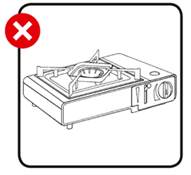NR15-005 Never use LPG camping equipment aboard
The reminder follows an explosion this June that injured a mother and a daughter at Westview Marina, Cambridgeshire. A gas cooker they were using inside their large tent exploded, causing them burns and leaving them needing treatment from the ambulance service.
BSS manager, Graham Watts explains, ‘When the liquefied fuel in the canister escapes it re-forms as a gas and its volume expands 250 times, so even portable gas equipment can cause a powerful explosion, easily big enough to send people to hospital and wreck a boat.'
 Out in the open, an explosion, fire, or carbon monoxide escape, can be bad enough, but in the poorly ventilated, tight confines of a boat, the same event can be devastating.'
Out in the open, an explosion, fire, or carbon monoxide escape, can be bad enough, but in the poorly ventilated, tight confines of a boat, the same event can be devastating.'
He advised boaters to think about the alternatives; ‘A flask is probably the simplest and safest way to provide hot drinks on a day trip.
‘If you want light, the latest battery powered or wind-up LED lights will last for ages and are far easier to use than gas lanterns.
‘Where a simple cooker is needed aboard, think about installing a marine spirit stove as an alternative to a portable gas stove.’
The Boat Safety Scheme (BSS) says boaters need to treat all portable gas equipment with huge respect and only use such equipment when ashore in open air.
Any boater deciding to use portable gas appliances need to be completely familiar with the correct and safe way of operation - from taking out of its storage case to fitting new fuel canisters.
These are the key safety points that can help to keep boat crews safe:
- Only use portable appliances onshore.
- *Stow any canisters, used or unused and any appliance if it has a canister inserted, in a self-draining gas locker, or on open deck where any escaping gas can flow overboard.
- Be familiar with the operating instructions before use.
- Before you start, check the appliance's condition, if the gas canister seal looks damaged, or if the appliances or gas canister is extremely rusty and deteriorated, do not use it.
- To avoid gas leaks and carbon monoxide poisoning check that all equipment has been correctly assembled before turning it on.
- Never attempt to fit a new canister to an appliance when aboard, wait until you are onshore.
- Before fitting a canister, put out all open flames and smoking materials.
- Ensure that you have the correct type of gas canister for your appliance and that it is being inserted in the right place and in the right way.
- If you smell or hear gas leaking before attempting to light an appliance, don’t use it.
- If any gas is leaking, ensure that it is being dispersed in free air well away from the boat or any sparks or other sources of ignition.
*Inland waterway regulations do not ban portable gas equipment on boats, but when not in operation, any appliance with a canister fitted and all spare gas canisters must be stowed in lockers that are self-draining, or on open deck areas where any leaking gas will flow overboard.
Don’t forget, even used canisters can still seep enough gas to cause an explosion so these must be treated like full containers.
The risk of escaping gas causing a pool of explosive vapour inside the boat must be avoided doggedly.
Many local fire services have more camping stove safety advice on their websites and Facebook pages.
– ENDS –
Notes:
The BSS is a public safety project owned jointly by Canal & River Trust and the Environment Agency. At least 12 other navigation and harbour authorities have also adopted it.
The navigation authorities’ purposes for the Scheme are to help reduce the risks of fire, explosion and pollution on small craft.
This is done by promoting fire safety and pollution avoidance advice to help boat owners keep themselves and their crews’ safe as well as regular examination of fuel systems, gas systems, electrical systems and appliances.
